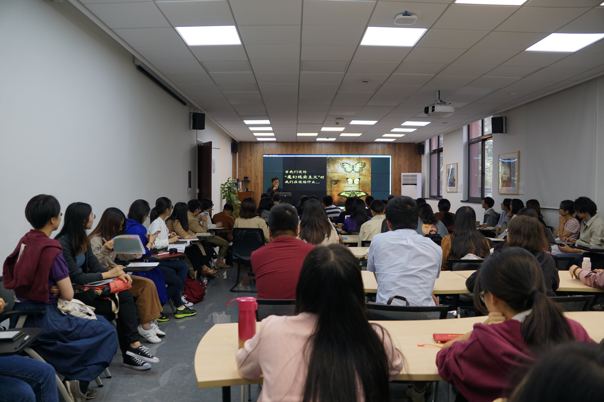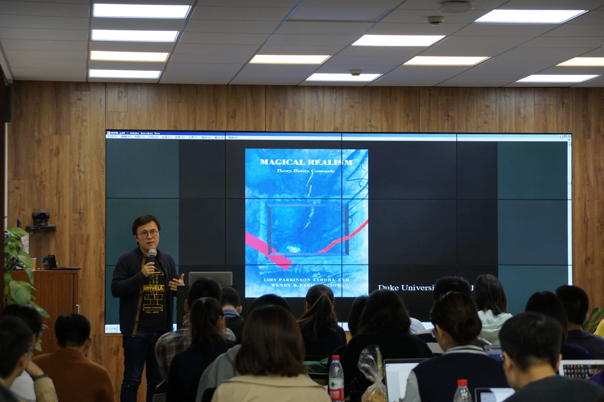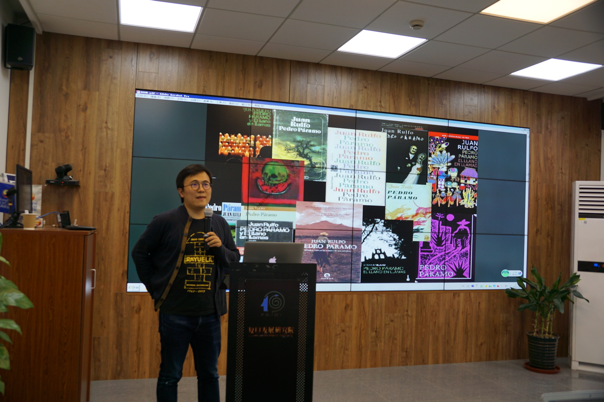The first lecture of “Latin America and China” series was successfully held by Fudan Development Institute and College of Foreign Language and Literature at 13:30,15th November,2018. The main topic of the lecture is “Whose Magic? Whose Reality? -- from ‘Yellow Butterfly’ to ‘Godzilla’” and the speaker is Dr. Fan Ye from the department of Spanish and Portuguese language, Peking University. He has translated several kinds of Spanish literary works, such as All Fires the Fire , One Hundred Years of Solitude, To The Future Poet and Unknown University. He also published the collection of essays “The Slowness of Poet”. More than eighty people including students and teachers from Fudan University were presented.

1. More than eighty people from Fudan University attended the lecture.
Dr. Fan Ye took “what are we talking about when we talk about magical realism?” as the point-cut of the lecture. He brought up the concept of magical realism which was extended from art criticism to literary criticism by introducing Spanish paintings. After that, Dr. Fan Ye sketched out the origins and changes of “magical realism” in the literary context. Magical realism is characterized by describing reality as magical things. At first, there was a difference between from reality and reality itself, but later, the marvelous real(in Spanish is lo real maravilloso) and the magical real have been used as synonyms in the history of literature. Magical realism was translated as magic realism in the context of Chinese literary criticism in 1975. It was translated into magical realism after 1979.

2.Dr. Fan Ye talked about Magical Realism.
Dr. Fan mentioned that in the opinion of Marquez, reality was the greatest author. The kid with pigtail in “One Hundred Years of Solitude” was not fictive but real because Marquez once mentioned that there was a young man from Barranquilla, Colombia confirmed himself with a pigtail in an interview. In addition to this, the slaughter of banana workers which was mentioned in his works was also real. Therefore, the “magical realism” embodied in Latin America literature was actually “reality”, despite that these realities are different from the realities in the European and American literary world. The surrealism in the European and American literary world may be the reality in the Latin American literary world.
Dr. Fan Ye believed that Latin America authors used to write like “Latin American” to fulfill the expectation of other people or they did the opposite deliberately. Both ways indicated the anxiety of Latin American identity. Marquez and other Latin American authors had the experience of studying or wandering in Europe, experiencing the surrealist campaign in Europe, looking back at their homeland through others' eyes, and solving the indigenous anxiety through looking back. Citing no passport is needed in the world of literature, he said that today (or 50 years later), Latin American writers would be able to write without anxiety and that identity was no longer the main focus of literature.

3.Dr. Fan Ye stated his opinion towards the anxiety of Latin American authors.
The series lecture of “Latin America and China” has 9 rounds in total, inviting well-known experts and scholars in the field of Latin America studies from China and abroad. On 18th November, Yu Man, director and doctoral supervisor of European and Latin American Studies of Shanghai International Studies University, will give a lecture on “Latin American Studies in China---Expansion and Development”. On 24th November, former president of Latin America Development Bank Enrique García will talk about about the current world situation and the future of Development Bank. On 26th November, Wei Ran, assistant researcher of the Institute of Latin American Studies, Chinese Academy of Social Sciences, will make a speech about “Latin American Literature, Third World and Intellectual Issues in 1986”.
Edited by Ge Xinyi
Translated by Liu Jia